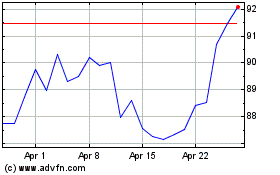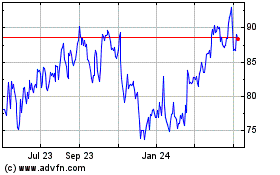BP to Buy Most of BHP U.S. Shale Unit -- WSJ
July 27 2018 - 3:02AM
Dow Jones News
By Rhiannon Hoyle and Sarah Kent
This article is being republished as part of our daily
reproduction of WSJ.com articles that also appeared in the U.S.
print edition of The Wall Street Journal (July 27, 2018).
SYDNEY -- BP PLC will buy the bulk of BHP Billiton Ltd.'s U.S.
onshore oil-and-gas unit for $10.5 billion, as the U.K. oil major
rebuilds in the U.S. after the Deepwater Horizon disaster and BHP
exits a business it has called a costly and mistimed
investment.
The sale accelerates a reshuffling of assets among global energy
companies as oil prices surge to levels not seen since 2014.
Chesapeake Energy Corp. said Thursday it is selling oil-and-gas
fields in Ohio for $2 billion, while Royal Dutch Shell PLC has
nearly completed a $30 billion asset-sale program begun after its
roughly $50 billion acquisition of BG Group in 2016.
It takes the total value of global oil-and-gas acquisitions
unveiled in 2018 to almost $188 billion, closing in on last year's
$287 billion, according to Dealogic.
The deal is an important milestone for BP, which is in the
middle of an ambitious growth plan. The company is on track to
stage a comeback after years of retrenchment following its fatal
blowout in the Gulf of Mexico in 2010.
The acquisition will grant the British oil giant access to some
of the hottest acreage in the U.S. shale patch where logistical
scale can provide a huge advantage. Big oil companies have
historically focused more on giant offshore projects, but they are
increasingly sinking money into shale developments that start
producing and throwing off cash faster.
For BHP, which will book a roughly $2.8-billion charge against
the assets for its 2018 fiscal year, it ends a costly saga that has
left the company roughly $20 billion worse off.
When the shale boom transformed the U.S. energy landscape a
decade ago, big global operators were caught off guard. Many
overpaid for assets for fear of missing out and often bet on areas
of the U.S. that weren't that productive. They also misjudged the
volumes of gas capable of being produced by new drilling
techniques, which weighed heavily on prices. Now there is so much
gas the U.S. exports the fuel around the world.
BHP paid a combined $20 billion to acquire U.S. shale assets in
2011, and then spent billions more to explore and develop them. But
a collapse in energy prices resulted in massive impairment charges,
including a more than $7-billion pretax charge in 2016 that is its
largest-ever single write down.
It also brought BHP into the cross hairs of activist hedge fund
Elliott Management Corp., which lobbied management to sell the
business after building up a stake of more than 5% in its
U.K.-listed shares. Elliott declined to comment on Friday.
"If we knew what we knew today you wouldn't do it," former
Chairman Jac Nasser said a year ago. "The timing was way off."
In a second deal announced Friday, BHP said it would sell its
Fayetteville shale business in Arkansas to closely held Merit
Energy Co., in an agreement worth $300 million. BHP said regulators
need to approve both deals, and it intends to return the sale
proceeds to shareholders. It expects to complete them by the end of
October.
The value of the combined deals topped market expectations for
up to $10 billion, said UBS. BHP shares were up 2.2% intraday in
Sydney.
BP Chief Executive Bob Dudley described the deal as
transformational for the company's shale business and a major step
toward delivering on BP's growth strategy.
It lifts BP's stake in a booming U.S. energy market which
produces record amounts of crude a day and exports four times as
much petroleum each month as it did a decade ago.
BP was initially wary on shale having long specialized in giant
offshore rigs and gas-export projects, which are prohibitively
expensive when energy prices plummet, so doesn't hold much land in
the country's most prized oil-and-gas basins like the Permian in
west Texas where shale drillers led a rebirth in U.S. energy
production.
But this deal gives "us some of the best acreage in some of the
best basins in the onshore U.S.," said Bernard Looney, BP's
upstream head.
While BP already has a sizable position onshore the U.S., its
portfolio mostly comprises gas. BHP's assets will substantially
boost the company's output of more valuable oil.
The deal will add 190,000 barrels a day of oil and gas
production and 4.6 billion barrels of discovered resources to BP's
asset base, promising output growth into the next decade.
In striking the deal, BP is attempting a delicate balancing act.
Despite rising oil prices, investors have signaled they want
companies to remain financially disciplined and reward shareholders
that stuck with them through a dramatic industry slump in 2014.
Alongside the acquisition, BP announced plans to raise its
second quarter dividend by 2.5% -- the first such increase in 15
quarters. It has structured the deal with 50% of the payment
deferred over six months after completion, funded through equity.
The company said that will allow the acquisition to fit within its
current spending budget and targets for gearing.
Robb M. Stewart contributed to this article.
Write to Rhiannon Hoyle at rhiannon.hoyle@wsj.com and Sarah Kent
at sarah.kent@wsj.com
(END) Dow Jones Newswires
July 27, 2018 02:47 ET (06:47 GMT)
Copyright (c) 2018 Dow Jones & Company, Inc.
Chesapeake Energy (NASDAQ:CHK)
Historical Stock Chart
From Mar 2024 to Apr 2024

Chesapeake Energy (NASDAQ:CHK)
Historical Stock Chart
From Apr 2023 to Apr 2024
